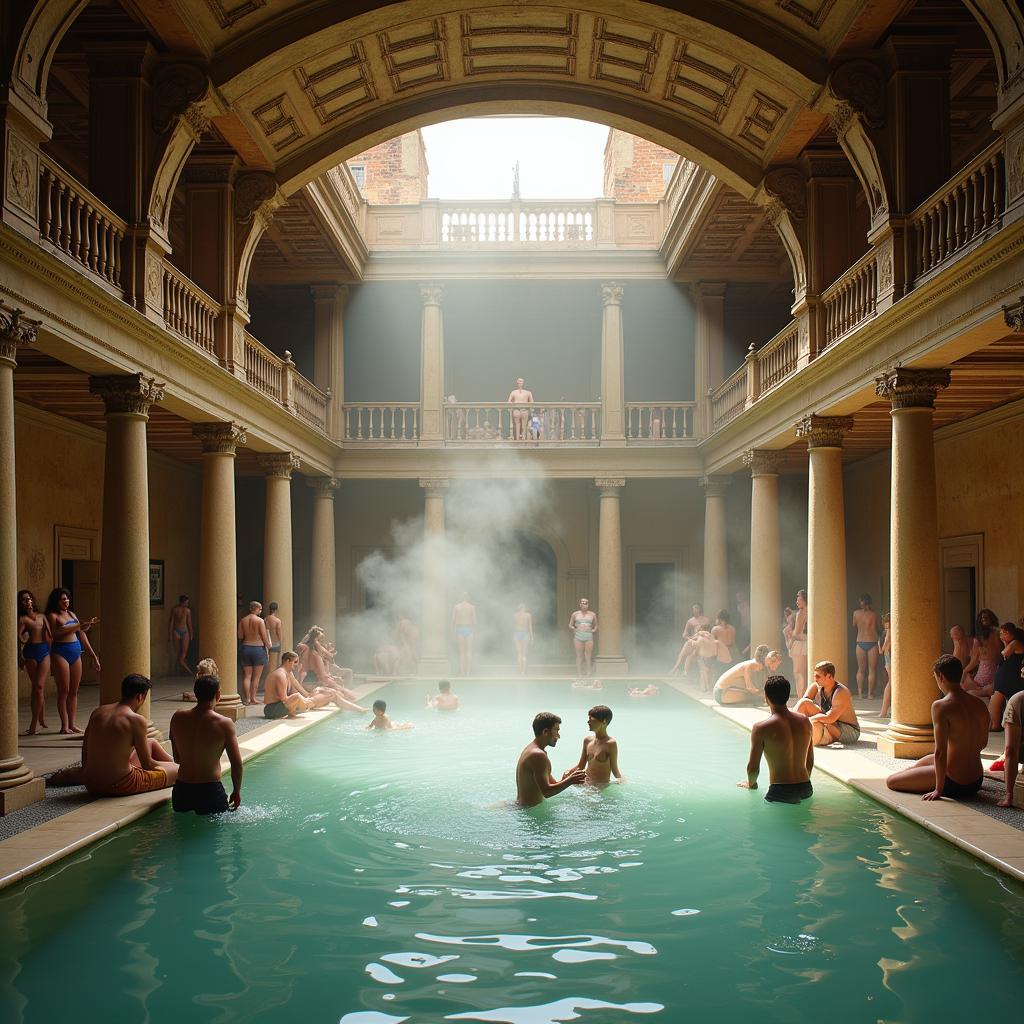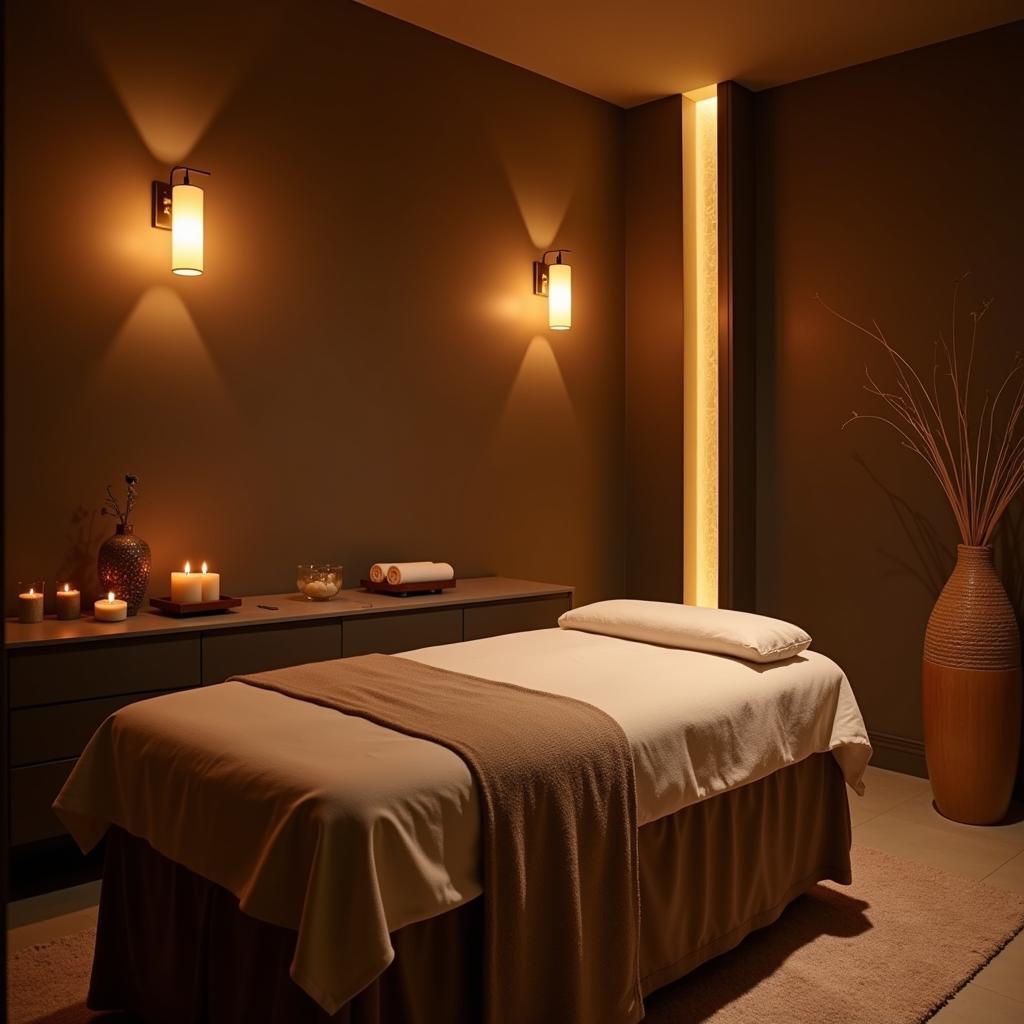Spa treatments are increasingly popular, offering a haven for relaxation and rejuvenation. But what does “spa” actually stand for? This comprehensive guide delves into the meaning of “spa full form in English” and explores the various aspects of the spa experience.
Decoding the Mystery of “Spa”
The origin of the word “spa” is shrouded in some mystery. The most common belief is that “spa” is an acronym for the Latin phrase “Salus Per Aquam” or “Sanitas Per Aquam.” Both translate to “health through water.” This theory links the word to the ancient Roman practice of using mineral-rich thermal springs for therapeutic purposes. Another theory suggests the word originates from the town of Spa, Belgium, renowned for its natural mineral springs, frequented for their healing properties since the 14th century. Understanding the spa full form in English provides valuable context for appreciating the historical significance of these wellness practices.
 Ancient Roman Baths and the Spa Experience
Ancient Roman Baths and the Spa Experience
The Modern Spa Experience: More Than Just Water
While the historical connection to water remains, modern spas have evolved significantly. Today, the term encompasses a wider range of health and wellness treatments. These can include massages, facials, body wraps, aromatherapy, and other beauty therapies. Modern spas focus on holistic well-being, addressing physical, mental, and emotional health.
Spa Treatments and Their Benefits
Spa treatments offer numerous benefits beyond simple relaxation. Massage therapy can alleviate muscle tension, improve circulation, and reduce stress. Facials can cleanse and rejuvenate the skin, while body wraps can detoxify and nourish the body. Aromatherapy uses essential oils to promote relaxation and emotional balance. These diverse treatments make the modern spa a comprehensive wellness destination.
 Modern Spa Treatment Room Designed for Relaxation
Modern Spa Treatment Room Designed for Relaxation
Choosing the Right Spa for Your Needs
With the increasing popularity of spas, it’s essential to choose one that meets your specific needs. Look for spas with qualified and experienced therapists, a clean and hygienic environment, and a range of treatments tailored to your preferences. Consider reading reviews and checking certifications before making a decision.
Understanding Spa Etiquette
Before visiting a spa, it’s helpful to understand basic spa etiquette. Arrive on time for your appointment, communicate your preferences and any health concerns to your therapist, and maintain a quiet and respectful atmosphere. Most spas provide robes and slippers, and it’s generally expected that you disrobe for treatments, though you will be appropriately draped for privacy.
Spa Full Form in English: A Deeper Dive
While “Salus Per Aquam” is the most widely accepted spa full form in English, it’s important to remember that the acronym is primarily a backronym – a phrase created after the word “spa” was already in use. Regardless of its precise origin, the concept of “health through water” remains central to the spa experience.
Conclusion
Understanding the spa full form in English allows us to appreciate the rich history and evolution of spa treatments. From ancient Roman baths to modern wellness centers, the pursuit of health through water and other therapeutic practices has endured. Today’s spas offer a diverse range of treatments designed to promote holistic well-being, providing a sanctuary for relaxation, rejuvenation, and the pursuit of a healthier, more balanced lifestyle. Remember the importance of choosing a reputable spa and understanding spa etiquette to maximize your experience.
FAQ
- What does spa stand for? The most common belief is that “spa” is an acronym for the Latin phrase “Salus Per Aquam” which means “health through water”.
- What are the benefits of spa treatments? Spa treatments offer a variety of benefits like relaxation, stress reduction, improved circulation and skin rejuvenation.
- How do I choose the right spa? Look for qualified therapists, a hygienic environment and treatments tailored to your needs. Check reviews and certifications.
- What is spa etiquette? Arrive on time, communicate your preferences to your therapist, and maintain a respectful atmosphere.
- Are all spa treatments water-based? No, modern spas offer a variety of treatments beyond hydrotherapy, including massages, facials, and aromatherapy.
- What should I expect during a spa treatment? Most spas provide robes and slippers. You’ll be asked to disrobe for treatments but appropriately draped for privacy.
- Is the “Salus Per Aquam” origin definitive? While widely accepted, it’s considered a backronym, meaning it was likely assigned after “spa” was already in use.
Need Support?
Contact us at Phone Number: 0373298888, Email: [email protected] or visit us at 86 Cau Giay, Hanoi. We have a 24/7 customer support team.